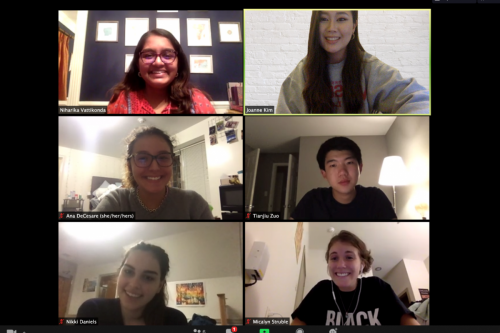
Duke’s Cyber Policy and Gender Violence Initiative seeks to explore and interrogate the ways digital systems affect survivors of gender-based violence. With a combination of data and policy, the initiative strives to understand how to combat technology’s negative impact on survivors. The initiative was co-founded by Duke students, under the guidance of David Hoffman, Steed Family Professor of the Practice of Cybersecurity Policy.

In recent years, a new tool of gender violence has emerged: stalkerware. Stalkerware is software that allows a remote user to surveil the activities of another person’s device without the person’s consent or full knowledge. Hoffman has documented huge increases in stalkerware implementation, exacerbated as the world occupies more space online from COVID-19.
“Stalkerware is a significant issue and needs much greater awareness. Potential victims need to understand where they can get information and help. The Duke Sanford Cyber Policy and Gender Violence Initiative will continue to focus on this and other related issues to identify mechanisms to use public policy to assist victims and survivors,” says Hoffman.
The initiative’s project "Stalkerware and digital harassment: A security toolkit for first-year students" is set to be published in EDUCAUSE’s 2020 Student Study Report later this fall. EDUCAUSE is a nonprofit association that works to advance higher education through the use of information technology.
Digital security is essential to protecting sensitive data; photos, videos, audio recordings, contact information, text messages, browser history, and more are accessible either openly on the Internet or via simple data breaches due to stalkerware. Thus, cybersecurity literacy is imperative to preventing these data vulnerabilities, Hoffman says.
Margolis Scholar Joanne Kim PPS ‘22 spearheaded the project to integrate cyberstalking/awareness materials into the Duke first-year orientation curriculum as part of her work as a research assistant with the initiative. As a result, the cyberstalking/stalkerware awareness curriculum was added to the Duke First-Year Advisory Council Board's original content for Fall 2020 orientation week. The content reached more than 1,700 incoming freshmen at Duke University.
“It was important to relay these resources and information to freshmen because they were entering a new campus that was, and still is, greatly divided and digitized due to COVID-19. The vision was to encourage first-years to think more critically about their digital footprints and also become more informed bystanders or cyber community members. This would ensure the safety of more Duke students and potentially reduce the number of cyber-related gender violence cases,” explains Kim.